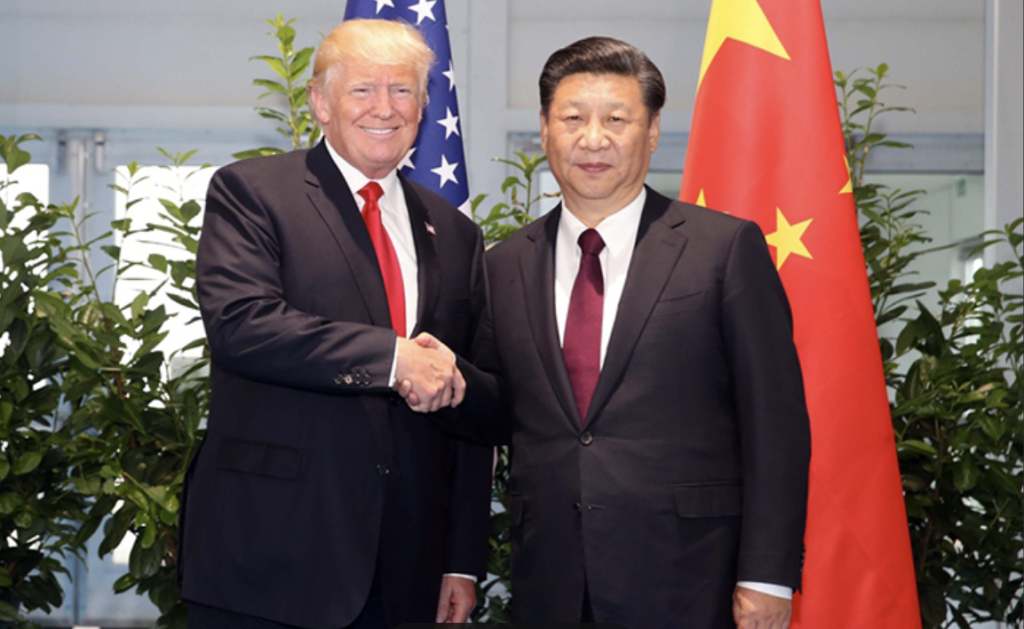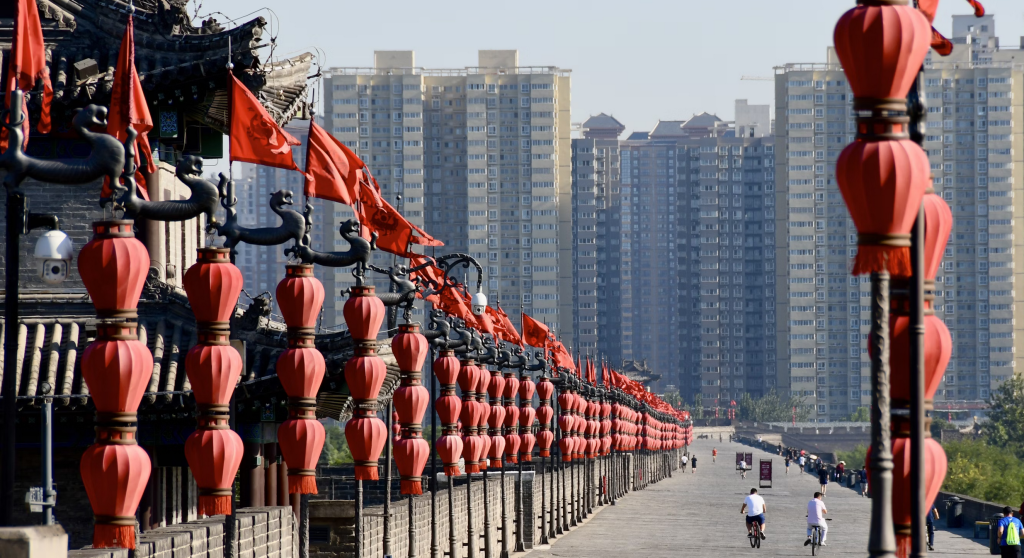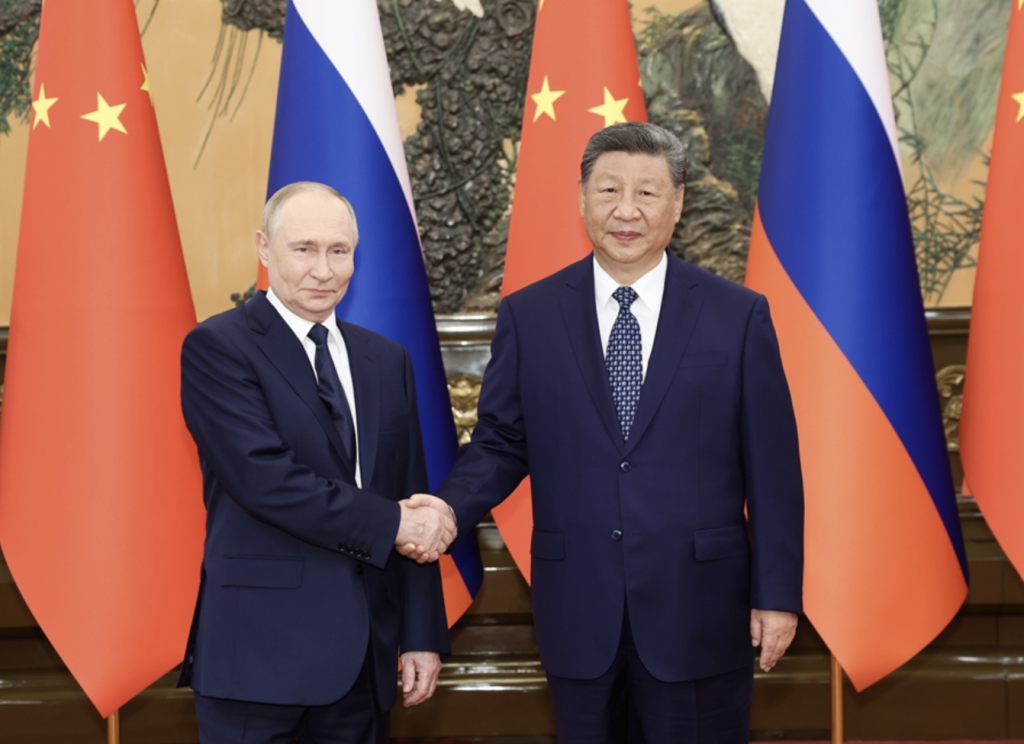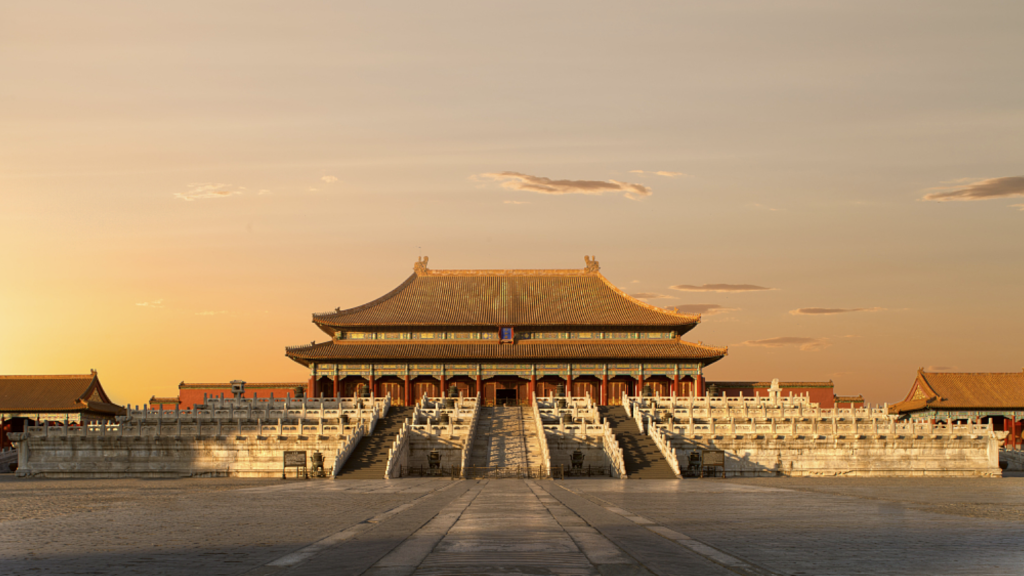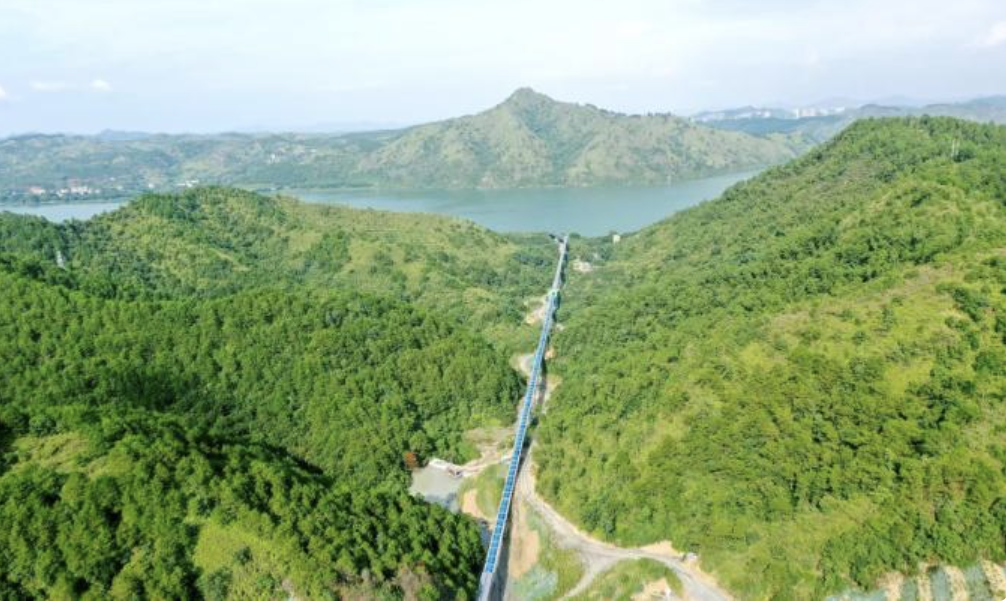Interview With Amb. Daniel Kritenbrink on US-China Relations and Managing a Stable Competition
China’s Peaking Power: An Interview with Michael Beckley
Michael Beckley is an associate professor of political science at Tufts University. He has held positions at Harvard’s Kennedy School of Government, the U.S. Department of Defense, the RAND Corporation, the Carnegie Endowment for International Peace, and is currently a Jeane Kirkpatrick Visiting Scholar at the American Enterprise Institute. His research focuses on great power politics, and his 2018 book, Unrivaled: Why America Will Remain the World’s Sole Superpower, offered an alternative view to the overpowering idea that the United States was in decline and would be overtaken by a rising China. Beckley serves as an advisor to the U.S. Intelligence Community and U.S. Department of Defense. You can read more of Beckley’s work on his website here.
Could you talk a little bit about your background and why you began studying China and what the environment of the US-China relationship was like at the beginning of your career?
I was always interested in the rise and fall of great powers. At the time, it was the early to mid 2000s, when China was booming and looked poised to rival the United States as a superpower. I thought, “This is going to be the event of my generation.” Even though the war on terror was raging and many people in my PhD program were studying counterinsurgency, I just thought for the future, the rise of China is clearly the most important event and so I just threw myself into it and I started traveling to China on a regular basis in 2008. The first time I went there was a month or two before the start of the Olympics in 2008, which even to this day, people remember as China’s coming out party. This was when China really announced its great power intentions on the world stage. I was determined to write my dissertation on decline management for the United States – if you’re a great superpower, how do you hand off power and responsibility to a rising power without triggering a massive war?
But then the longer I spent in China, the more I started to see the weaknesses in the Chinese system. Then, I started digging into the data on China’s economy, on its social policy, on its military, and just realized that some of these weaknesses were debilitating, and that, if you looked ahead, they’re probably only going to get worse in the future.
Then, I just started charting them and collecting all this data and when I looked back at the charts, I just saw this chronic gap between the United States and China. That then shifted my focus to really trying to explain, “how do countries amass wealth and power? What causes the rise and fall of great powers?”
You started out your career thinking you would do research about the US being a falling power and China being a rising power. But now, of course, a lot of your research since then has been about how China will not overtake the US as a global hegemon, which you talk about in your book, Unrivaled. Can you elaborate more on why you think that, and have you ever reconsidered that assessment that China doesn’t have the ability to overtake the US?
The two main arguments I make in the book and in related articles are first, that the gap between the United States and China is a lot bigger than most people think. That’s because most people measure the balance of power with gross indicators, such as GDP, military spending, trade volumes, research and development spending, and manufacturing output. What I’ve found historically is that these are terrible indicators of national power. They’re really no better than a coin toss about who actually wins disputes and wars internationally, or which country becomes dominant. For example, China in the 19th century had the largest economy and military in the world. But it still just got ripped apart – first, by the British whose economy was half of China’s size and who had a much smaller military, and then again by the Japanese.
I thought, “Wow, our whole discipline is based on simplistic measures of power that can’t even explain well-known cases in international history.” I decided to develop better indicators, and the basic insight I found was that you have to look at power in net terms, not gross terms. The problem with all those indicators I talked about before is that they systematically exaggerate the power of countries with big populations, because they count all the advantages you get from having a big population, like a big economy, a big military, but not the costs of having to support and protect and clean up after that massive population. So what I did was I created these new measures of net wealth and net military power, for example, where you basically just put each country’s assets and liabilities up on the board and just do some basic arithmetic and you can come to some bottom line calculations.
This explains the China-British case. The British had a much smaller economy and smaller population, but they also had a lot fewer mouths to feed. They had better technology and were way more efficient, so in net terms, they had much more wealth and vastly greater military power than China, and trounced the Chinese in the Opium Wars. It’s the same thing today between the United States and China. So that’s the first argument: the overall economic and military gap between the United States and China is much larger than most people think.
The second argument is that the U.S. has better fundamentals than China and is therefore more likely to amass even greater wealth and power in the future. Countries rise and fall for more big picture tectonic forces that are almost beyond anyone’s immediate control – things like geography, demography, and political institutions.
I found that when you plot these, the United States just has much better fundamentals going forward. It’s just going to have a much easier time than China. China, demographically, is going to go through the worst aging crisis that we’ve ever seen because of the One Child Policy. Geographically, China is surrounded by more than a dozen hostile or unstable countries and it has decimated its natural resources, having lost half its freshwater and arable land over the past couple decades and become the world’s largest food and energy importer. By contrast, the United States is a food and energy exporter because its territory is packed with resources and surrounded by friends and fish with just Canada, Mexico, and two oceans. Institutionally, the United States obviously looks completely shambolic right now, but China looks even worse because at this point it’s become this rigid oligarchy that’s ruled by a dictator for life, and Xi Jinping has consistently shown he’ll prioritize political power over economic efficiency.
When I plotted out these longterm drivers, it just seemed like the US had better – not perfect – but better fundamentals than China, so in addition to a big lead, the United States also has more advantages. That’s why I’m pretty confident in the overall balance of power.
Now, you asked me, have I reassessed this? Basically, my research has gone through three phases. The initial phase where I thought China was overtaking America and I wanted to explain how to make that happen peacefully. Second, showing this gap in power between the United States and China. Now, the third phase of my career is really focusing on what happens when a rising power realizes it’s going to fall short and that it’s actually not going to overtake the dominant power. That its economy is starting to slow, and it’s starting to get surrounded by rivals. Basically, what happens when a rising power peaks?
I’ve been studying this for the last three or four years and it just scares me because every case where this has happened has not ended well. Peaking powers do not go down without a fight. They don’t mellow out. They tend to get more aggressive as well as repressive internally. China seems to be basically following the historical pattern to a T.
It’s not that I necessarily question my initial takeaways from that second phase of research, but now I’m just so much more aware that even if China never comes close to rivaling the United States and overall power, that doesn’t mean that’s not a massive threat both to the United States and to the rest of the world.
You can have a country whose economy starts to become stagnant, but then puts all of its resources into a short term military operation. I’m really worried that that actually could be the case with China over something like Taiwan. Even if the country overall is stagnant, if it’s an authoritarian regime, it may actually actively promote authoritarianism around the world, precisely because it’s scared that as it gets weaker, forces of regime change are going to start coming for it, so they need to prop up authoritarians around the world, or they may feel they need to carve out an economic empire because they need captive markets and access to resources that they worry they won’t be able to get just from a booming economy, which they no longer have. Now, I’m just looking at all these ways where China may become more aggressive even as the long term threat of a rising China may dissipate.
You have stated that in the next 10 years US-China tensions will peak. What can we expect to see during this period? Will it be a lot of that aggression you touched on, or should we look out for anything else?
It’s important to remember that China is not just any great power, it’s what we call a revanchist great power. The CCP, and in fact, I would assume most Chinese people, believe that there are lost Chinese territories that have to be taken back at some point, that were ripped away from China unjustifiably during the century of humiliation that rightfully belonged to China and that need to be taken back. Hong Kong, Taiwan and the Eastern South China Seas are, in the minds of most Chinese, Chinese territory. What I worry about is that the CCP is looking ahead and saying, “Well, right now, we’ve acquired a pretty formidable regional military. In the future, we’re not going to have as much money for it because our population is going to be aging, and it already seems like our rivals are starting to get their act together.”
The United States and Taiwan, for example, have very ambitious plans that could basically make Taiwan almost conquerable within a decade. Then, when China looks at the East China Sea, they see Japan is now planning to double its defense spending, and is letting American F35s launch off of its new aircraft carriers. When they look in the South China Sea, those countries are weaker, but they’re no joke. Vietnam has a long history of slaying giants, and Vietnam is building a pretty formidable coastal defense system with Russian missiles and submarines. Indonesia has been increasing its defense spending by 20% the last few years to build a navy to push back on China’s.
So, I just worry that the Chinese will say, “We have this closing window of opportunity to really stake our claim to these lost territories before they could be ripped away from us forever, and so we need to move now.” Xi Jinping in particular has said that these problems cannot be handed down from generation to generation. The first thing I worry about is a smash-and grab-operation, and I especially worry about it vis-à-vis Taiwan. As you well know, and seeing what’s going on in the Taiwan Strait right now, this is the most aggressive show force China’s made in more than a generation. So, that’s the first thing I worry about.
The second is that past slowing great powers have tried to reboot their economies by basically carving out economic empires abroad. It’s like, “if we can’t compete on the open global market, then we need to have captive markets where we deal with countries that are basically dependent on selling into our market, that are dependent on our technology, that are dependent on our loans and investment.” It’s a form of light neocolonialism. We saw this with all past great powers when they felt that their domestic economy was running out of steam – they looked for new markets and new resources abroad. I just think China’s Belt and Road initiative is just yet another version of this. It’s a way to give Chinese state-owned enterprises a way to make money now that they’ve built all the roads and bridges that China needs – and a bunch of those aren’t even that useful. What are all of the real estate companies going to do if there’s no more apartments that can viably be built in China?
They need new markets. That’s what Belt and Road is all about. What we’ve seen in history is that this severely exacerbates competition, not just economic competition, but military competition, among great powers. The European Scramble for Africa, when the European powers in the late 19th century just poured into Africa and started fighting with each other over colonies, is an extreme example, but we’ve also seen it in the early 20th century. Again, I worry that China’s trying to recreate a light economic empire and those tend to turn into these rigid, exclusive economic zones that exacerbate geopolitical competition.
Then, the third thing I worry about is China spreading authoritarianism around the world. In particular, this digital authoritarianism that China has already pioneered and beta tested in its own provinces, which just makes authoritarianism so much more efficient than it ever used to be – using algorithms, and big data, and millions of cameras, and facial and speech recognition technology – to basically create an Orwellian state that can monitor entire populations, and then selling those technologies and helping run those systems abroad. People ask me, “Why would China do this? It’s not really an evangelical power.” But the reason – and this is in leaked Chinese documents – is that the Chinese rightly understand that authoritarian regimes tend to fall in waves. There was this big wave after the end of the Cold War, where communist authoritarian regimes just started collapsing, and China almost went down, Tiananmen Square happened, right? They’ve experienced it firsthand.
We’ve seen that anytime there’s been times like the Arab Spring and the color revolutions in Eastern Europe, any time there’s been a wave of democratization, or at least of revolutions, that have toppled authoritarian regimes, China starts to crack down immediately at home because, as political scientists have shown, there’s contagion effects where people see the success of democratic revolutions in one country and think it can happen in their country as well. China doesn’t want that to happen. In addition to repressing their own population much more aggressively, they are also trying to prop up authoritarian regimes around the world. They’ve been doing this for a long time – you could pretty much pick a dictator anywhere in the world, and you can find some level of Chinese support for him or her.
But what scares me the most right now is that now China has these new technologies that are just so attractive for tyrants because they make it really cheap. Instead of having huge internal security forces and death squads marching around and beating populations into submission, now you just first put cameras everywhere and monitor them, and then second, use your equivalent of Facebook or Facebook itself to send messages and fake news and to manipulate public opinions, so you have this very subversive form of propaganda that people don’t even realize is coming from the state. They think it’s coming from other people and their peers, when really they’re just a bunch of bots that the state has created. It spread a lot faster and makes it harder to dislodge over time, and we’re already in a democratic recession – every year since 2006, the level of democracy has been creeping back downward. Now, dictators have these new technologies at their disposal and China is the fountain that’s pouring these things out – China’s literally operating these systems in more than 80 countries in the world already.
Those are the three main things. I just worry that as China starts to worry about its own future, it gets more aggressive militarily, it tries to reboot its economy through economic empire, and that it tries to prop up authoritarians with these new technologies to insulate itself.
This is not about trying to evangel. I don’t think the Chinese really care whether other countries copy their model. They’re not an evangelical power like the Soviet communists were, but they are very much worried about revolution, and one way to insulate themselves is by propping up other authoritarian regimes that won’t criticize them for their own human rights abuses. Also, frankly, they destabilize democracies, because if democracy looks like it doesn’t work very well, then the Chinese people are less likely to demand democratic reforms. I just worry about China going the Russian route and trying to destabilize democracies as well.
You talked about how China is going to start worrying about itself. Of course, one of the things it will be worrying about is its changing population demographic with its huge aging population and the smaller working population. How do you foresee Chinese policy shifting to adjust for this?
Well, I think one, they’re not going to do immigration because it would be too destabilizing for the society, and China is already adopting a much more ethnic conception of what it means to be Chinese. Han nationalism is very much a thing in China, so it’s hard for me to foresee them suddenly letting in immigrants and even if they did, China’s literally going to lose 70 million working age adults. That’s a France sized population just between now and the early 2030s. At the same time, they will gain 130 million senior citizens, which is like an entire Japan of senior citizens that’ll be added on within the next 10 to 15 years alone. I mean, there’s just no way you can make that up through immigration alone. It’s not going to be immigration.
I think what they will do is first turn to automation. This is one of the many reasons why they’re pouring so hard into things like AI robotics, because they’re going to need an army of machines to do the work that their aging population won’t be able to do. Then second, just to clamp down, so that if they have to cut benefits, or they don’t provide a social safety net for people, that doesn’t translate into popular unrest. I think that’s one of the reasons they’ve really ramped up the repression over the last 10 years because they want to be ready for any kind of discontent that may arise when they start to ask Chinese people to start tightening their belts. At this point, most people in China are millennials or even younger, so they’ve really known nothing other than rapid economic development. But I think the regime is looking out ahead and saying, “Well, we may not be able to sustain 6% to 10% economic growth rates forever, so what are we going to give to Chinese people? Well, we’re going to promise them nationalism and we’re also going to make sure that we have an apparatus that can keep things clamped down at home.”
I think those are really China’s two main options. I don’t see what else they can do, because they’ve already abandoned the One Child policy and birth rates have still declined. I thought it was instructive that a few years ago they said, “Okay. You can have two children.” Then, Chinese families had even fewer children than they did before. They’ve said, “Okay. You can have three children,” but now, the birth rate is going down even more. Unless they literally start forcing Chinese families to breed, which I don’t even think China would do, I don’t see how you can solve this demographic problem, other than through automation and then just internal security to make sure that the inevitable discontent that’s going to come out doesn’t overflow into political instability.
Shifting to US policy, so much of US foreign policy about China has been about seeing China as a threat to their hegemony. But now, if it seems that China has peaked, how do you think that US policy will change to handle a falling China as opposed to a rising one?
In some ways, those broader categories of whether China is rising or not almost don’t matter for the day-to-day of what we’re going to be dealing with over at least the next 10 years. It’s not so much about whose GDP is bigger at this point, it’s about whether China can take Taiwan or not, are they going to try to take Taiwan, are they trying to lay down all the 5G networks across Eurasia so they can get access to everyone’s data as well as make countries dependent on Chinese technology? Those are really the key questions. What I’m focused more on now are the local balances of power. There’s all these specific issues that have their own local balances of power.
So, the balance of power and the Taiwan Strait is not the same thing as the global military balance. While I’m very confident in the global military balance, I’m very not confident in the balance of power in the Taiwan Strait. Same thing with the battle over telecommunications networks, and same thing with the battle over who’s going to dominate AI and these new technologies that could really be game changers for innovation.
For US policy, fortunately, I think there is considerable awareness about each of those three areas I talked about before. If there’s one bipartisan issue in DC, it’s pushing back on China militarily, economically, and in terms of governance. My only worry, obviously, is that these things can easily spiral out of control. One thing we’ve seen in history is that when arising power starts to fall short, it starts to act more aggressively. Then, what usually happens is the other great powers start to turn the screw on it even more to try to deter it and they end up sort of pushing it over the edge. The nightmare example is Imperial Japan, and how we got into World War II in the Pacific, where Japan’s economy started to run out of steam and the United States just kept tightening economic restrictions on Japan, and so the Japanese said, “Well, let’s just go for broke. We’ll attack them at Pearl Harbor and hope for the best.”
To me, the key question is how do you manage resolving on the one hand the need to deter China in a place like Taiwan or economically, but on the other hand, not pushing it over the edge where it’s backed into a corner and it has really no other option other than to lash out. That’s something I’m actually really struggling with at the moment, just because so many of the policies I think are so necessary to deter Chinese aggression I could also see sort of pushing China into that aggression. I don’t know if there was a cut and dry way to resolve that tension. To me, that is the fundamental issue in US foreign policy for at least the next 10 years.
Do you agree that Taiwan is the most volatile issue of the US-China relationship?
I do, I do. That is the one that keeps me up at night just because it’s far and away the most likely place for an all out war between the United States and China. I think on the Chinese side, it’s pretty clear that China’s determined to, as they say, “liberate Taiwan” one way or another. I think the Chinese have determined that their peaceful options for reunification are pretty much gone, or they’re dwindling very fast. They look at the opinion polls in Taiwan and more and more people solely identify as Taiwanese, not as Chinese, and 95% of the population at least wants to maintain de facto independence and some even wanted to declare independence outright. So, they look at the political trends in Taiwan and they’re not promising. I honestly think when they moved on Hong Kong a little over a year ago that it was a very ominous sign for Taiwan because the Chinese used to take a softer line on Hong Kong in part because they didn’t want to scare the Taiwanese and make a mockery of the One Country, Two Systems formula that they were trying to offer to the Taiwanese. The fact that they’ve just blatantly violated that in Hong Kong shows that the CCP is like, “All right. Enough is enough. Enough pigeon footing around this. We’re going to just start using coercive methods in Hong Kong and now we’re going to turn to Taiwan.” So, I think the Chinese have made pretty clear that they’re going to take Taiwan back one way or another and they’ve built up this huge military apparatus to do that.
The United States, I think, if push comes to shove, is going to fight over Taiwan because, one, there’s geostrategic importance with that ‘unsinkable aircraft carrier’ in the heart of the most vibrant region in the entire world. But, also, it’s been a convenient way to keep China down and, obviously, most Americans and certainly policy makers in DC see China as the main threat to US primacy, so you cannot let your main competitor just steamroll over a critical piece of territory. There’s also just the moral case, too. This is the only Chinese democracy, and there’s also implications for US alliance relationships. If you don’t defend Taiwan, well then, what are other allies going to say? Does that not shatter the whole bargain the United States has made with dozens of countries, where “We protect you in exchange for deference and loyalty and abiding by this broader system that we’re trying to construct.”
What I’m trying to say is that there’s a clear conflict of interest here. Both sides have made it pretty clear that they’re willing to use military force over it. I just think the issue is coming to a head, partially because China’s peaceful options are not looking very promising and seem to be getting worse every day, partially because China now has new military options it didn’t have 10 and certainly 20 years ago just in the Taiwan Strait – its missiles, its aircraft that can launch more missiles, its amphibious ships that can ferry troops across, and its big navy. China’s turned out warships at a rate we haven’t seen for many countries since World War II over the last 10 years. It has these new capabilities, but then looking ahead may not be so confident that Taiwan is going to stay open for very long. Because now, as I said before, Taiwan and the United States are realizing that their militaries are too vulnerable. They’re advanced, but they’re based around relatively small numbers of weapon systems, like fighter aircraft in Taiwan’s case or aircraft carriers in America’s case, and they’re based at just a few huge vulnerable bases, so they basically put all their eggs in very few baskets. Taiwan and the US have totally realized that’s a problem and now they’re trying to turn Taiwan into a porcupine. They’re going to have lots of anti-ship missile launchers, mines, and drones everywhere. They’re going to turn it into World War I style “no man’s land” in the Taiwan Strait, and that will make an invasion or a blockade very hard to pull off.
I just worry that these windows, these opening and closing windows of opportunity, and just the fact that the two countries are now squarely focused on each other as rivals is just setting itself up for a big throw down.
In 10 years or so, if China does continue to be stagnant and fall, do you foresee other Asian countries buying for the power left behind by that falling China? If so, who? Or do you think there would be other countries who would struggle a lot with the power change and the loss of China?
First of all, I don’t think China’s going to fall or disappear. Some of my articles recently have come out, and, unfortunately, authors don’t get to pick their titles. There was one article that said China is a declining power. I don’t think China’s a declining power. I think it’s a peaking power and it’s going to remain the most powerful country in Asia for the foreseeable future, even if its economy stagnates.
But that said, what other countries are going to move in? Obviously Japan was the dominant power in east Asia and remains, I think, underestimated by people considering how powerful Japan is, both militarily and, obviously, economically. I think Japan will certainly try to consolidate its control over the East China Sea if China waivers. Now, all of these Southeast Asian countries, I don’t think anyone is powerful enough to become dominant, but I could see just a much more competitive multipolar system in East Asia.
For the United States, that’s kind of another challenge for the US. In addition to dealing with China, you also have to provide if you care about stability in East Asia, which I think the US absolutely should. How do you orchestrate an order that is stable so that countries know that they can plug-and-play with a global economy without having to worry about their shipping being pirated by their rivals? How do they know that they can wire their telecommunications networks without being eavesdropped on or becoming vulnerable to becoming dependent on some other country’s technology?
It’s going to be chaos. It’s going to be a game of Thrones, right? That’s why I think the United States needs to be the one to step in and serve as the balancer, as the one that holds the countries together. The US has traditionally done that with what they call the hub-and-spokes system.
I think that’s probably still the best way to go where it’s not that you have to create some East Asian NATO to keep everyone together, but you do need to maintain military and economic presence so that countries know that you’re there as the third party to resolve disputes and just tamp down conflict to make sure it doesn’t spill over.


